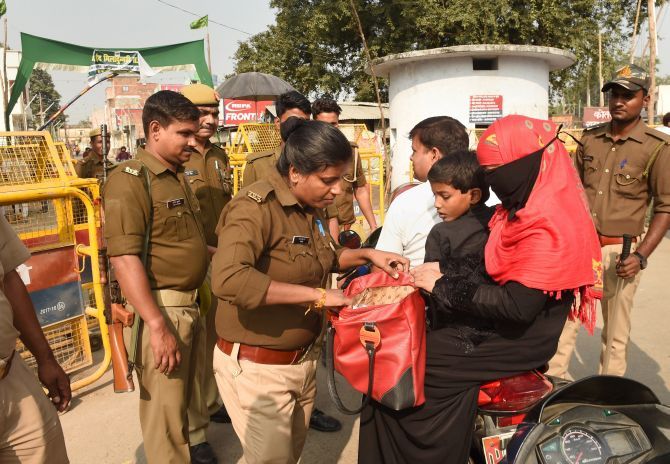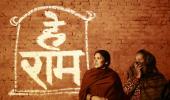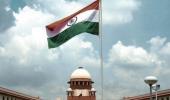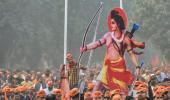'The court can strengthen the verdict by ensuring that Muslims don't feel shortchanged or cheated.'

In an Rediff.com interview a few months ago, Valay Singh, author of Ayodhya: City Of Faith, City Of Discord, had said "Earnest negotiations without politics is the only way to resolve this dispute peacefully. If a solution is forced upon Muslims, there will be irredeemable bitterness."
On Saturday, November 9, the Supreme Court passed the much-awaited judgment on the long-festering Babri Masjid-Ram Mandir dispute and ruled in favour of Ram Lalla, a disputant in the case.
While Singh believes the judgment isn't "perfect", he tells Savera R Someshwar/Rediff.com that it offers a way forward.
Three months ago, you told my colleague, 'I was once told by a retired high court judge involved in the Ayodhya matter that no court would pass an order that is unenforceable'. Is this the order you were expecting?
In a sense, all indications were pointing to a verdict that would acknowledge the wrongs done to the Muslims in 1934, in 1949 and in 1992; however, it would defer to the majority Hindu sentiment and pass a centrist judgment.
It's not a perfect judgment, but nothing can be really ideal in such a case.
Instead of mandir or masjid, the Supreme Court decision has said mandir and masjid. Is this part of ensuring an enforceable decision?
That is a bit early to say.
We have to await and see where exactly the land for the mosque will be allotted.
As far as the temple is concerned, it is already there in the makeshift tent.
What is your initial reaction to the judgment?
I think it's a measured judgment that has tried to find a way forward.
I will have to read the full judgment to comment further.
The judgment set aside emotional factors and based it on the evidence of the ownership of the land. Do you agree with the court's direction or do you feel emotional factors should have been considered as well?
The court has considered emotional factors, an example of that is that the court has acknowledged the belief of the Hindus that Ram was born there.
You said in your earlier interview to Rediff, 'Earnest negotiations without politics is the only way to resolve this dispute peacefully. If a solution is forced upon Muslims, there will be irredeemable bitterness.'
Will the Muslims see this as a forced solution?
It's too early to say.
However, most working class Muslims as well as Hindus in Ayodhya are fatigued with the dispute and want to move on.
The court can strengthen the verdict by ensuring that Muslims don't feel shortchanged or cheated.
In fact, so far the all sides have moderated their reactions in the interest of peace and harmony.
We should continue to be sensitive to each other's feelings and not offend each other.
Five acres are to be given to the Sunni Waqf board for the building of a mosque. Will this help?
There are various shades of opinions among Muslims.
You have heard the statements of the likes of Owaisi, while the Sunni Waqf Board has said they will study the order and decide on filing a review.
Do you believe Ayodhya's 'rich Buddhist history' and that the structure beneath the mosque could have been a 'Buddhist temple' has been ignored?
The Supreme Court has said there was a structure beneath the demolished mosque, but has not stated that the structure was a temple.
The fact that the Supreme Court order doesn't categorically say what kind of structure existed beneath in fact underlines that it could be a Buddhist structure as well.
How will this decision impact the BJP and the non-Hindu sections of Indian society?
I am not sure what you mean.
The BJP is likely to claim victory. We will have to await the reaction of others.
Do you foresee long term reactions to the judgment?
Definitely, this is a landmark verdict.
In the days to come, how the state and central government proceed on the order -- that will determine how people react to this.
Will the government facilitate a mutually satisfactory and equal course of action or will it end up being partisan towards one community -- that will determine the reactions.
Right now, all have to respect the verdict and make that the basis of the way forward.
What kind of reactions do you expect to see from the political parties? What can they to ensure communal harmony and do you think that will happen, especially with the coming elections in Delhi?
I am hopeful that parties will not be able to misguide the people on this issue.
Will we see more such issues of mosques versus temples, with spillovers in disputed sites like Mathura and Kashi?
It can't be said for sure. I certainly hope not.
What does this judgment mean for secular India?
Secular India is on a slide for many years and this doesn't stop that slide.
The Supreme Court judgment says placing of Lord Ram's idol in 1949 was an act of desecration and that the demolition of the Babri Masjid was wrong. Do you believe the judgment validates that 'act of desceration'?
No, it doesn't validate. In fact, it admits that a mosque was forcibly entered into and an idol was placed, which has finally led to today's verdict.
How important was this verdict to be a unanimous one, in your opinion?
In fact, I am surprised by the unanimity.
That there is not even a notion of disagreement in such a landmark ruling is quite telling of the times that we live in.
Will today's verdict raise Modi's stock?
With his appeal for peace, and with a pro-temple verdict, it certainly does.










